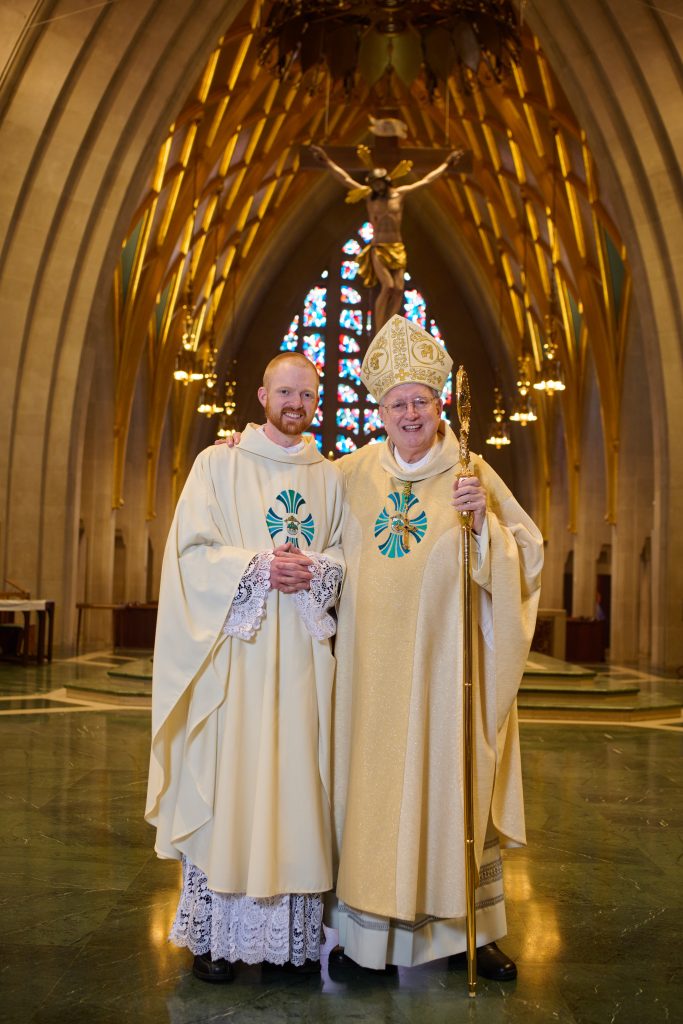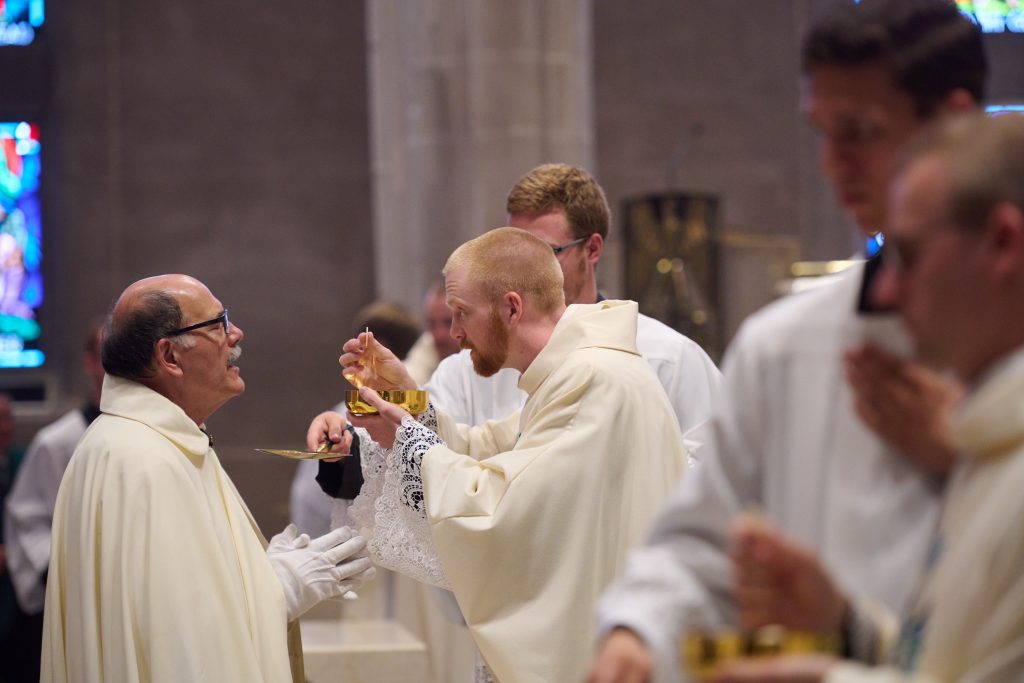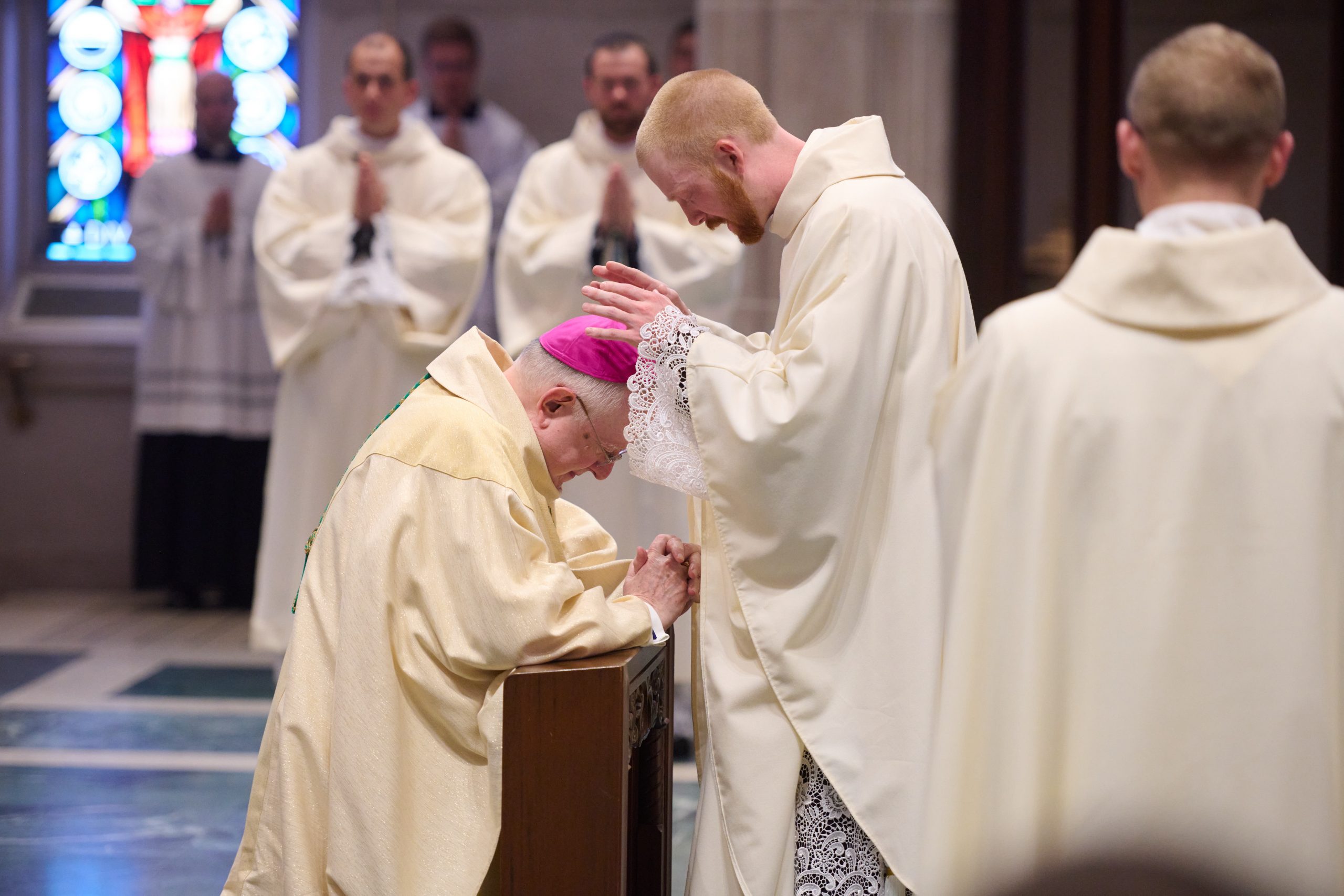How the holy sacrifice of the Mass defines a priest’s identity
“Every high priest is taken from among men and made their representative before God, to offer gifts and
sacrifices for sins.” (Heb 5:1)
If I have learned anything over the course of my 21 months as a priest, it is that without the Eucharist, my life means nothing. The Eucharist is the source and summit of our faith (cf. CCC 1324), and, more particularly, it is the source and summit of the priest’s identity. It is where I find my deepest longings and desires satiated, and it is the path which Jesus has laid before me as my way of salvation. With this understanding, I invite you more deeply into my life as both priest and victim at the altar of the Lord.
Life-Changing Moments
On June 24, 2023, the Solemnity of the Nativity of John the Baptist, I was ordained to the Priesthood of Jesus Christ. It was the day my life would be forever changed—through the permanent character imprinted on my soul in the sacrament of holy orders, a configuration to Jesus Christ the High Priest—in a way I never could have imagined.
Just three days into my priesthood, I celebrated my first Mass at CrossWoods Adventure Camp in Delta, Wis. During that week, I experienced for the first time what it truly means to be a spiritual father. Immediately, campers, chaperones and staff began to relate to me in ways I had with other priests, but never had experienced from the other side. They trusted me, confided in me and opened up to me in some of the most beautiful ways I have ever known.

As a newly minted priest, the “new priest smell” still had not worn off, yet my lack of experience did not matter to those who came to me. They sought something that I could now offer. I realized that these people had experienced the effects of ordination—that is, my configuration to Jesus the High Priest. They wanted Jesus, and that is who they saw in me.
As you can imagine, you live your life differently when people see you through this lens. Suddenly, your every action and word carries a weight it did not before. In a certain sense, the gravity of being a priest becomes palpable. As a priest, it is very easy for this weight to crush you if you do not fully grasp the reality of the priesthood. The reality is, though I am conformed to Christ the High Priest such that I have the power and authority to forgive sins and confect the Eucharist, it is Christ who is acting through me. The moment I forget this is the day that I crash and burn as a priest.
The Weight of Vocation
While the weight of this understanding can be excruciating, it also brings a sense of comfort. In feeling that pain, I also feel a closeness to Jesus knowing He is there to help carry my cross. Just as Jesus is both priest and victim on the cross, so am I. Thus, to find the fulfillment presented and offered to me, I must receive and give as Jesus did. As a priest, I am so radically configured to Jesus that I, “cannot fully find [myself] except through a sincere gift of [myself].” (Gaudium et Spes)
This is not only the case with priests, but for all of us. While the married couple finds their sacramental perfection—that is, their self-gift—within the intimacy of marriage, the priest finds his sacramental perfection in giving himself on the altar, on the cross. Thus, without the altar and without the Eucharist, my life literally holds no meaning. Without the Eucharist, I cannot reach my sacramental perfection. In a way that is so challenging to articulate, it is within the agony of the cross that I find solace, purpose and fulfillment.
Even before I was ordained a priest, my vocation story found its foundation in the Eucharist. As I prepared to enter my senior year of high school, I had the opportunity to go on a mission trip to Estes Park, Colo. While we were there, we celebrated Mass in many varied places. The most vocationally significant location occurred in Rocky Mountain National Park. The priest accompanying us, Father Greg Bohren, delivered a homily about the importance of pursuing things that bring real, lasting joy rather than settling for the things that bring only fleeting pleasure.

During this homily, memories flooded my mind: serving at the altar, being surrounded by good and holy priests, and the profound realization that if my hands were consecrated by a bishop, they would be able to consecrate ordinary bread and wine so that they become the body, blood, soul and divinity of Christ.
I prayed about this experience that evening and asked our Lord what He was trying to tell me. In no uncertain terms—and with a certainty unlike anything I had ever experienced in my life—our Lord said to me, “Jared, I want you to be my priest.”
It was the eucharistic sacrifice that drew me into the vocation He had prepared for me. There, Jesus was able to prepare my heart to receive the call He had in store. He was calling me to be His priest—the one He would ordain to handle His very body and blood, the one to whom He would entrust the care of souls: to mend them, and to be an instrument of His forgiveness.
In saying yes to this call, I said no to many other good things. Even at the call’s very onset, I was not entirely sold on the idea of becoming a priest, despite knowing it was what God called me to do. It wasn’t until a year and a half into my time in seminary that I began to fall in love with the priesthood. It was during an eight-day silent retreat at Broom Tree Retreat Center—in the absolute middle of nowhere, South Dakota—that God revealed His heart to me and showed me what He had in store. He also assured me that if He is calling me to this life, with all the sacrifices it entails, He will provide the graces necessary to live it out.
Rooted in the Eucharist
This realization hit home for me: my entire identity revolves around the Eucharist. It is centered on giving myself as Christ did on the cross. After that retreat, I began to approach my Holy Hours differently. They transformed from just a time to complete prayers into opportunities for me to speak with and be in the presence of the One who created me, who loves me beyond all telling and who is my Father—He who created me to be His priest.
Now, after my ordination, this relationship has become all the more fundamental. It has become abundantly clear that the Eucharist is the necessary link to the Father that a priest needs to come to understand his identity. There is nothing more important than a priest’s participation in the sacrifice which is the very essence of the Eucharist.
The priesthood is predicated on sacrifice. No sacrifice, no priesthood. Jesus, the perfect High Priest, offered Himself as the sacrifice acceptable to God as expiation for our sins. As a priest, I am conformed to Jesus in this way. Thus, when I celebrate the Mass, I become, like Him, a victim being sacrificed for the forgiveness of sins. My whole self is united to Christ on the cross. The Mass, from the perspective of the priest, is something integral to my very existence.
The Liturgy of the Eucharist has a special place for the priest. From the beginning of the offertory to holy Communion, the priest experiences the Mass in this way. During the offertory, he brings all the prayers entrusted to him and places them on the altar. All the pains, struggles, joys and life experiences shared by the congregation are presented as an offering to God.
Participating in the Sacrifice of Christ
During the Eucharistic Prayer, particularly during Eucharistic Prayer I (the Roman Canon), the priest, like the priests of old, who on Yom Kippur placed their hands on the head of a goat (the scapegoat) for the remission of sins, places his hands over the offerings of bread and wine. He places the sins and prayers of the people onto the head of the lamb to be slaughtered—at present, the bread and wine, which will become Jesus, the Lamb of God.
Next, as the priest holds up the bread and say the words of institution, “Take this, all of you, and eat of it, for this is my body, which will be given up for you,” he is not only speaking as Christ did 2,000 years ago in persona Christi capitis (“in the person of Christ the head”) but also for himself. He gives himself totally as Christ does on the cross. The priest then says this a second time while holding up the chalice in reference to the blood. When consecrating the blood, the priest spiritually pours out his blood onto the altar with Christ, who bows His head and says, “It is finished.” (Jn 19:30) In this moment, the priest is spiritually dead, just as Christ is on the cross.
As Christ’s blood is separated from His body, so is His soul. Without blood, we die. Thus, in offering His very blood on the altar, Jesus gives Himself totally unto death. After praying the Lord’s Prayer, during the fraction rite, Christ’s body is mingled with his blood. If the separation of body from blood is death, then the reuniting of body and blood is His resurrection. Indeed, the priest then declares, “Behold the lamb of God. Behold him who takes away the sins of the world. Blessed are those who are called to the supper of the Lamb.”
The Eucharist Renews a Priest’s Identity
As the priest—who is, at that moment, spiritually dead—receives the Eucharist, Christ enters into him, so that, as St. Paul says, “It is no longer I who live, but Christ who lives in me.” (Gal 2:20) The priest is now filled with Christ and able to literally bring Him to the rest of the congregation, who—if they have followed this same mode of offering themselves as baptismal priests, distinct from ministerial priests—are then invigorated by our Eucharistic Lord. This is what makes the Eucharist the source of the priest’s identity.
Of course, just because I am a priest, it does not mean that I fully understand this at all times. There is always more to understand, more to learn, and more to receive from God. As a priest, I am “taken from among men and made their representative before God, to offer gifts and sacrifices for sins.” (Heb 5:1) At the same time, because the priest is taken from among men, he “is able to deal patiently with the ignorant and erring, for he himself is beset by weakness and so, for this reason, must make sin offerings for himself as well as for the people.” (Heb 5:2)
I am acutely aware of my own sins, failings and weaknesses—particularly since I preach daily about things I do not always practice well myself. I know well what the Church teaches about sin and mercy, and I understand St. Augustine’s thought: “We cannot do good without God.” Yet I still fall short. In many ways, it is because I fall—and because I am human—that people come to me all the more, as I can relate to those who strive to do good and come up short.
I have come to recognize just how much I need God’s grace and mercy in order to live out the life I am called to live. I long to be with Jesus always. It is in his embrace that my identity is secured. The Eucharist is where I have that encounter every day. It is where I can embrace my cross and present it to Jesus. It is where I renew my identity each and every day.
Without the Eucharist, the priest finds reason to question his existence. Without the Eucharist, the priest does not have a source of renewal. Without the Eucharist, his role becomes meaningless. As a new priest, I have come to deeply appreciate and long for the Eucharist, for it truly is the source of my identity.
By Father Jared Clements, Associate Pastor, Our Lady of Peace Parish and Sacred Heart of Jesus Parish in Marshfield, Chaplain at Columbus Catholic Schools
Published in the Summer 2025 issue of Catholic Life Magazine

